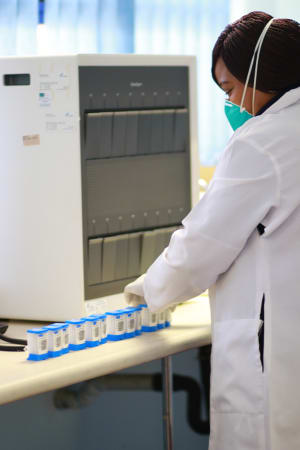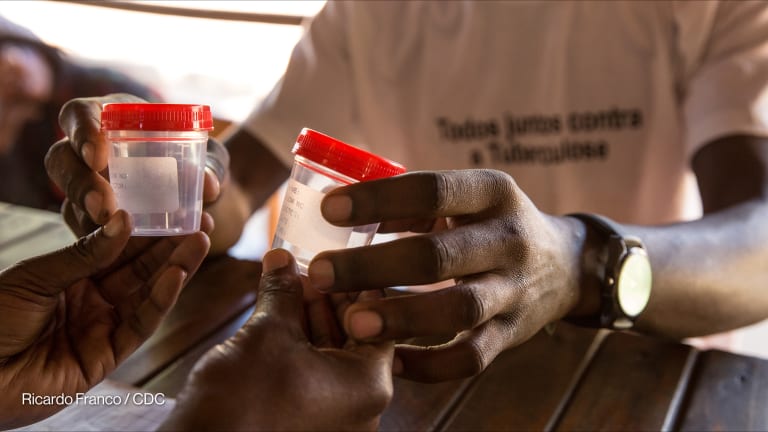Opinion: Millions of missing TB cases hold keys to fixing public health

In a rural area of Eswatini, 4-year-old Samkeliso is playing in her home. She isn’t coughing. No one thinks she is sick. That is until community champion Sifiso Nzima arrives at her family’s doorstep. Every day, Nzima travels the rural area by bicycle checking on people’s health, and he has been trained to notice symptoms others don’t. He sees that the girl weighs less than she should and recommends that the family get her tested for tuberculosis, or TB.
Until that moment, Samkeliso was one of the “missing millions” with TB across the globe. Of the 10.6 million people who developed active TB worldwide, it’s estimated that approximately 3.1 million were untested, undiagnosed, untreated, and unreported in 2022. These missing millions are children, parents, and grandparents. They live on rural homesteads and in city apartments. Without treatment, they will continue to spread TB to others and, tragically, could die from a disease that is preventable and treatable.
TB disease disproportionately affects the most vulnerable populations around the world. For example, children, migrants, refugees, and people living with HIV are at higher risk of being exposed to, developing, or dying from TB. TB disease impacts low- and middle-income countries the hardest. Similarly, TB also exposes and exploits the weaknesses in our public health systems. If we look at how millions of people with TB disease go missing, we find critical health systems gaps that must be addressed — not just to eliminate TB but also to identify and respond to many other diseases that threaten our health and security globally. Because of this, the missing millions have lessons to teach us about what the global community can and must do better to strengthen health systems and save lives.
1. Strengthen public health capabilities
Our first lesson is that core public health systems too often have critical gaps or weak links. For example, it has been said that as many as 70% of medical decisions may be based on laboratory testing. Yet, we too often ignore what is needed to ensure that laboratories can deliver accurate and timely results.
We have learned that initial investments in laboratory capacity and quality are only the beginning. Strong laboratories require ongoing attention to quality improvement, including training and mentorship, to help meet and maintain international standards. Over time, instruments and safety equipment need maintenance or repairs, or they will become nonfunctional. This leaves laboratory professionals at risk of compromising their own health and unable to do their jobs.

Without sustained support, experts who spend their days conducting lifesaving work will find themselves back at square one, without any way to tell if someone has TB, or if they have a strain that’s resistant to the most commonly used antibiotics — or even a new strain that’s resistant to all of them.
We also know that the laboratory diagnostics and systems we use for TB can help with many other diseases and that a responsive and resilient laboratory network is essential for handling any health challenge that comes our way. For example, when we needed to do molecular testing during the COVID-19 pandemic, we relied heavily on the molecular instruments and laboratory networks that were initially built for TB and HIV.
That is why, as we put these kinds of vital laboratory capacities in place, we must also commit to maintaining them fully and sustainably. Further, we must recognize that core capacities are not just about equipment and physical infrastructure; they are also about up-to-date national policies and strategic plans. They are about trained human resources, multi-disease and integrated testing platforms, and laboratory networks that deliver the right information at the right time. They require multi-sector collaboration that goes beyond ministries of health and includes other areas such as finance, education, labor, and social welfare — all working hand in hand.
2. Harness the potential of public health data
A second lesson is that public health data only matter when they are used. The missing millions show us that it’s not enough to collect and report case numbers up to the national level or the World Health Organization; we need to make data accessible at the local level and prioritize using data to design and implement strategic, targeted interventions. This is not only a problem for TB programs but reflects an important gap in public health at large.
To fix this, we can learn from examples such as the U.S. Centers for Disease Control and Prevention’s Expand Engaging Local Experts in Validating and Analyzing TB Data to END TB, or ELEVATE, program. ELEVATE has been working in India to train more than 720 state and district staff in using data to improve TB diagnosis, treatment, and program planning, helping them to protect 565 million people living in their communities. The program has proven to be successful and uses a model that can be applied in other countries and for other diseases to make public health data save lives.
Related to this, the missing millions also teach us that we must diligently reach the unreachable. Case finding is at the heart of solving this TB challenge, and that begins with a skilled public health workforce. From the community TB champions who traverse Eswatini on bicycles to the hard-working diagnosticians in laboratories across the globe, we must continue investing in the people on the frontlines. A strong public health workforce prepares us for any new disease that might strike.
Reaching the unreachable also requires that we continue to remove the barriers that prevent people from seeking care. This includes creating more community awareness, addressing stigma, and providing patients better access to the support they need, whether that’s at a hospital, a community health center, or in their homes.
3. Pursue innovation
Last, but most certainly not least, the missing millions reveal a critical need for innovation. To find the missing millions and connect them to lifesaving treatment we need simplified testing approaches, shorter and easier treatment regimens, cheaper and more effective diagnostics, and vaccines that work well and for all people. Dreaming for the future, we can imagine a world where people can access self-tests and self-screening tools. The COVID-19 pandemic highlighted both the important role of and inequities in access to self-testing globally. We must pursue development and widespread access to such game-changing innovations for TB.
Yes, we can end TB
By reviewing public health systems’ successes and challenges, the missing millions teach us where to focus our next efforts. We need to develop new TB drug-resistance tests in parallel with new drug development so that we can understand the effectiveness of new drugs and treatment regimens. We need community engagement to overcome barriers and improve access to and quality of care. We need to break down the silos that exist in public health, recognizing that when we invest in TB, we get benefits across the board. Failing to do so could result in 6.6 million additional deaths from TB and a trillion dollars lost by 2030.
Explore related stories on the CDC.gov website:
- Scaling Quality Assurance Programs to Support Accurate and Reliable TB Testing (cdc.gov)
- Hope on Two Wheels: Finding Missing TB Cases in Eswatini (cdc.gov)
The fact is that 4-year-old Samkeliso was one of the lucky ones. Because she lives in a country that invested in novel approaches; she was found, given treatment, and cured. There is much to be proud of in her story, but also much to do to strengthen public health systems and ensure we find every one of the missing millions. We owe it to them — and to our shared future. Yes, we can end TB!
Search for articles
Most Read
- 1
- 2
- 3
- 4
- 5









